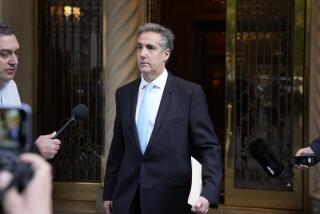Cohen Visits U.S. Troops in Persian Gulf
- Share via
KUWAIT — U.S. troops in the Persian Gulf received laurels Wednesday from Defense Secretary William S. Cohen for their performance in last week’s air assault on Iraq, but his praise was coupled with an urgent request: Don’t bail on us now.
During a quick holiday season tour to Saudi Arabia, Kuwait and the U.S. aircraft carrier Enterprise, now in the Gulf, Cohen told the troops that “without you, we wouldn’t be the superpower that we are.”
Then he told them in the same breath that he was deeply concerned that the strains of military life are driving some of the best of them away, and he promised a sharp increase in federal spending, and other changes, to keep them on the job.
“We want to recruit you, we want to retain you,” Cohen told flight crews at Prince Sultan Air Base in central Saudi Arabia, as he and his wife, Janet, greeted the troops in appearances with singers Carole King, Mary Chapin Carpenter and David Ball. Cohen agreed to cancel a concert with the entertainers at the base after the Saudis objected to a daytime performance during Ramadan.
The comments showed that, even as they congratulated their team for a mission well done, defense officials worry that difficulties in hanging on to talent could begin to erode the military’s performance.
Only this week, the Clinton administration gave this issue new prominence on its budgetary agenda by proposing big hikes in military pay, coupled with restoring some retirement benefits that had been cut back 12 years ago.
The proposed pay hikes, the biggest since 1981, would increase salaries for all 1.4 million active-duty troops by 4.4% beginning in 2000. And increases of as much as 9.9% will go to troops--including technical personnel--whose services are desperately sought by both military and civilian employers.
The proposed hikes in retirement pay would allow those with 20 years of service to again claim 50% of their pay as retirement income. Since 1986, the figure has been rolled back to 40%.
The administration is at odds with Congress on other aspects of the defense budget. To the administration’s discomfort, for instance, many Republicans want to increase defense spending by $20 billion in fiscal 2000. But there is apparently broad bipartisan support for the pay and retirement plans, which would add $30 billion over the next six years to the $250-billion defense budget.
These proposals brought Cohen some of the biggest cheers of the day Wednesday as he visited airmen, sailors and soldiers in the Gulf. “They really need to do something,” said Petty Officer 1st Class Richard Hall of Norfolk, Va., who saw Cohen on the Enterprise. “They’ve just let it go to hell.”
Yet troops in the Gulf may be especially aware that pay and retirement are not the only issues. Both the pace of overseas deployments--at least for some specialty troops--and the quality of life they lead are also cited as reasons for leaving the service.
In interviews during Cohen’s trip, airmen spoke of being sent to the Gulf three or four times a year because of the need to monitor the actions of Iraqi President Saddam Hussein.
The military is trying to reorganize to spread the burden of these deployments more broadly among the various services. And the Pentagon is taking steps to improve the quality of life--especially in remote places such as the Gulf region, where concerns about terrorist attacks have made it unsafe for troops to leave their bases.
One conspicuous example of the military’s efforts is at Prince Sultan Air Base. Not long ago, the American quarters there were scarcely more than a cluster of tents next to an airfield.
The U.S. Air Force area at the base is still built around a large group of tents, and the base’s 4,000 Americans are surrounded by concrete barriers and 40 miles of concertina wire to protect them from terrorist strikes.
But now, every tent has a television with a 12-channel cable hookup and a VCR, and the base has Burger King, Baskin-Robbins and other American-style food concessions. The area also has four swimming pools, a roller-hockey rink and four volleyball courts, among other recreation facilities.
“We give them what they need,” said Gen. Anthony Zinni, U.S. commander for the Mideast.
More to Read
Sign up for Essential California
The most important California stories and recommendations in your inbox every morning.
You may occasionally receive promotional content from the Los Angeles Times.














